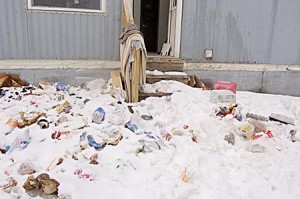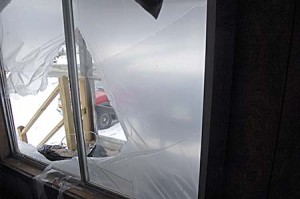

copyright the Chronicle April 15, 2015
by Tena Starr
In July of 2014, Vernon and Rose Warner rented a trailer in Lowell to a man and his son. They say they received $300 at the time, and nothing since. The monthly rent was $550.
Now, the tenant is gone, which the Warners discovered by accident.
The Department for Children and Families (DCF) called the Warners and asked if the boy still lived at the mobile home with his father, Mrs. Warner said. She said she went to the trailer after that phone call, found it unoccupied and trashed, and also found an application to DCF for shelter expenses.
That application says the tenant had paid a $1,500 deposit, but rent was overdue in the amount of $750. It includes Mr. Warner’s signature, dated December 6.
Mr. Warner said he did not sign the application, nor is it true that the tenant paid a $1,500 deposit.
“He never paid it, but he wrote that he did,” Mrs. Warner said.
If he had, it still wouldn’t have covered the damages, the Warners said.
“Oh, my God, what a mess,” Mrs. Warner said. “Everything was strewn from hell to breakfast.”
A big bedroom window is smashed, the sink is clogged with cigarette butts, garbage is strewn outside the back of the trailer, and inside. Because there was no heat, the toilet, which is full of feces, is broken, and the water doesn’t work.
Mr. Warner can’t get out to check the property because he’s had a stroke. Both he and his wife are in their seventies.

The trash outside the trailer includes everything from soda bottles to pizza boxes and used diapers.
“I got a 14-yard dumpster, and it will be full,” Mr. Warner said. “It cost me $1,000.”
“That hurt us,” he said. “That’s money we could have used.”
He said he’s been renting for 47 years, but he’s done now.
There have always been bad tenants, the Warners said, but in the past six or seven years it’s been worse. About 70 percent are problematic, Mr. Warner said.
He attributes the problem to “welfare.”
He’s under the impression that his tenant applied for DCF help, got it, and ran with the money.
There’s certainly every indication that the tenants left in a hurry. Clothing, toys, shoes, half empty cigarette packs, and even family photos are still in the trailer.
But the tenant would not have been the recipient of the money he applied for, even if the application had been granted, said Brooke Brittell, associate director of outreach services at NEKCA in Newport.
How that program works, she said, is that the application is verified with the landlord, and money, if granted, goes directly to the landlord, not the tenant.
The one person at DCF who was allowed to talk to the media about how the program works was out sick.
By Thursday, the trailer had been partially cleaned, with much of the inside trash and detritus bagged up, but Mrs. Warner still looked around in dismay. And bafflement.

In Barton, Dan Vanasse said he, too, is familiar with tenants who damage his rental units. He and his wife, Pauline, are also well acquainted with troubles getting the rent.
Mr. Vanasse said he had to evict a tenant for nonpayment of rent last fall, and another last summer. Eviction is slow and expensive, he said.
“They are so well protected legally. At first they have all kinds of money, to move in. Then it gets a few days late, then weeks late, then months late. Then you send a letter to evict them.
“The registered letter is no good anymore. They go to the post office, the postmaster tells them who and where it’s from, so they don’t pick it up.”
The Vanasses have two duplexes for rent. One of the rental units is empty at the moment, Mr. Vanasse said.
“And we’re not excited about renting it.”
In fact, he said, it will take between $4,000 and $5,000 to get the place ready to rent again.
“We’re $1,500 in the red with our apartment houses,” Mr. Vanasse said.
The tenants evicted from it in the fall had not put fuel oil in the tank, so the heating system froze, he said. He expects repairs to the furnace alone will cost between $1,000 and $2,000.
“Usually we lose $3,000 to $4,000 before we get them out,” Mr. Vanasse said, speaking generally about tenants who have to be evicted, and nine out of ten of them do have to be, he added.
“The court system is not in your favor,” he said.
Older tenants tend to be good tenants, he said. But many don’t stay long. They may have sold their house and are renting while they wait for an opening in senior housing.
“We can’t keep the good tenants because that’s what they do,” Mr. Vanasse said.
“Anybody who can afford the rent, or is what we’d call a good tenant, they don’t come to Barton,” he said. “That’s why we’re leaving them empty. We lose one way or another.”
Mr. Vanasse said he’s been renting since 1991, and “it just keeps getting worse.”
He was once more forgiving, but these days, if a tenant is 30 days behind with the rent he starts eviction proceedings. It’s not likely the tenant will catch up and be able to pay the back rent, he said.
Yes, emergencies come up for people, he said. He tells his tenants to “look at the squirrels,” who prepare for lean times.
Like Mr. Warner, Mr. Vanasse is finding that it can be discouraging — and not very profitable — to be in the rental business.
“Right now, if I could sell my two places, I’d get out,” Mr. Vanasse said.
And that, unfortunately, is likely to be one of the long-term consequences of irresponsible tenants.
In the bigger picture, bad tenants do a big disservice to everyone else, not just landlords, said Angela Zaikowski, an attorney who is also director of the Vermont Apartment Owners Association, a trade association for Vermont landlords.
The behavior of some tenants could well lead to a lot of rental properties simply being taken off the market, Ms. Zaikowski said.
“There’s limited accountability from folks who are causing the problem,” she said.
Attorney Angela Ross in Albany has represented a number of landlords. She said she sees eviction cases “all the time. It’s actually a little ridiculous how often you see it.”
They’re slow and expensive for the landlord, she said, who must send a certified eviction notice, then wait.
“And if they don’t leave, and most of them don’t, you have to start a Superior Court action, and that costs a lot of money. You can’t do this in Small Claims Court.
“You have to pay the Superior Court fee, about $275, you have to pay the sheriff to serve them, and some tenants avoid service, so you have to go back to court and get a tack order.”
That means that, since some tenants simply avoid being served with an eviction notice by not answering the door, the court agrees that “tacking” the notice to the door is acceptable.
Ms. Ross said that in the last eviction case she had, the Sheriff’s Department went out six times in an attempt to serve the notice. The landlord had to pay every time.
“Then you wait for the court to set a hearing,” Ms. Ross said.
And it could be a lengthy wait.
The state keeps “cutting the courts’ budgets,” she said. “The courts don’t have time for these cases.”
Ms. Ross has little advice for landlords beyond this: “There’s nothing better than vetting a tenant.”
Ms. Zaikowski’s recommendation is the same. The days when a handshake, or a person’s word, were sufficient, are long gone, she said.
“With this particular type of relationship, that’s not working for landlords anymore. Use a written application. Get some information. Find out are they going to be able to pay the rent. Do a Google search on the person. Be cautious and make sure of who can pay the rent and is going to treat the property with respect. Did you collect a deposit? Did you collect the first month’s rent? These are tools you can use to protect yourself.”
“The one time that landlords have complete control of the rental property is when it’s vacant,” Ms. Zaikowski said.
If a problem does occur, the tenant is entitled to at least 30 days notice before being evicted, she said, but it’s a myth that tenants can’t be kicked out in winter.
A landlord does have tools for recovering back rent, Ms. Zaikowski said. The tenant can be taken to court. Wages and bank accounts can be garnished, and real estate can be attached.
The problem there, of course, is that deadbeat renters often have neither wages nor real estate.
As Mr. Warner put it, “You can’t get blood out of a stone.”
Ms. Zaikowski said her association has a lobbyist in the state Legislature trying to level the playing field a bit for landlords.
“Do I think there are things that can be done to make the laws better balanced? Yes.”
On the other hand, she said, she’s well aware that there are difficult landlords, too.
“We know there are going to be bad players on both sides. For every landlord story out there about a horrible tenant, there is an equally horrible one about a landlord.”
But Vermont generally is “a consumer protection state,” Ms. Zaikowski said.
Mr. Vanasse has his own idea about how to vet potential tenants.
For one thing, the court system should set aside a day a week to deal with evictions, he suggested, so cases don’t get stalled.
For another, he’d like to see someone start a sort of tenant registry that could be checked to see if a particular tenant has a history of nonpayment or causing property damage. A landlord would report a bad tenant, and potential landlords would know the risk they’re taking if there’s a sketchy past there.
“That would turn things right around,” Mr. Vanasse said.
Mr. Warner largely blames the state for his troubles, but also says that landlords should get together and form an organization to support each other and work at changing the rules.
Meanwhile, Ms. Zaikowski said, her association can help, although it does not get involved in legal matters, and she urges landlords to visit vtlandlord.com.
Ms. Brittell at NEKCA said that organization is now working more closely with both tenants and landlords. Case managers can monitor a living situation for six months, then check back in within a year to see how things are going, she said.
“The hard part is that there’s not a lot of support around tenant responsibility and how they interact with people and how they keep their place,” she said.
Case managers at NEKCA are trying to remedy that, Ms. Brittell said.
“It’s definitely frustrating for landlords when they have tenants who crap all over them.” The new program is an attempt to get everybody on the same page, she said.
contact Tena Starr at [email protected]
For more free articles from the Chronicle like this one, see our Editor’s Picks pages. For all the Chronicle’s stories, subscribe:
Print subscription
Annual online subscription
Short-term online subscription







